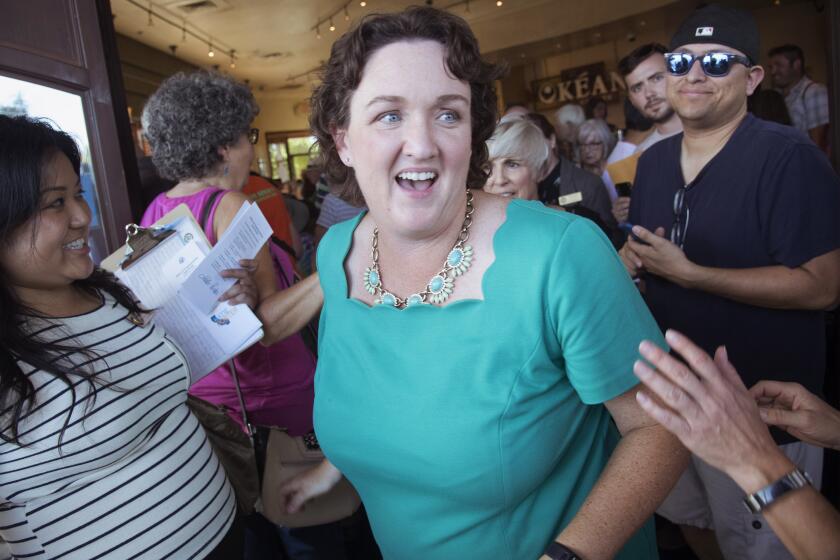Finance Reform Is One Sure Way to Keep the Bums Out
- Share via
What I don’t know about the state budget could fill this and many future columns. You almost have to be sitting in the Capitol day in and day out to fully comprehend what’s going on in Sacramento, and they don’t pay me nearly enough to want to do that.
So, the newspapers provide my daily updates, and for the most part they’ve read like the crime blotter. After seeing the words surrender , hostage and negotiations in story after story, you begin to wonder if you’re reading about state government or the script of an old “Kojak” episode.
My impression is that Gov. Wilson may have won his public relations campaign to portray the Legislature as a bunch of nincompoops who, left to their own devices, never would have solved the problem. And it’s left me thinking that Californians probably are counting the days until the term-limit initiative passed in 1990 becomes law.
I wouldn’t pop the champagne corks just yet.
I’ve never quite understood how automatically changing the faces in the Legislature every two years or so is going to give us a better budget or a better state. I do understand quite clearly how entrenched incumbents can metamorphose into awful legislators, but I’d rather find a way to get rid of them without expelling people who are committed to public service and serve honorably over a lifetime.
It so happens that’s also the thinking of California Common Cause, which, although not dogmatically opposed to term limits, thinks they should only be enacted if accompanied by campaign finance reform.
Kim Alexander, a Common Cause policy analyst, said her view of the streets of Sacramento during the budget crisis revealed a lot of restless natives.
“I’ve seen lots of stories about how angry people are and how this crisis is going to possibly result in the massive overthrow of incumbent legislators,” Alexander said. “But I’m not quite sure that’s going to happen or sure that that’s the solution.”
Alexander said she fears that the public, understandably frustrated at the system’s ineptitude, will assume that frequent changing of the guard will solve the problem. The problem, she says, is not that incumbency is inherently corruptible but that challengers have no realistic way of competing against them.
Sacramento has seen its usual August flurry of fund-raisers for incumbents, all heavily attended by the special-interest forces. It’s a money pool from which immediate challengers obviously can’t draw and probably can’t match. And without the money, challengers will always have trouble unseating an incumbent, no matter how unhappy voters may be.
That would seem to argue in favor of term limits, but as Alexander points out, that in and of itself won’t purify the Legislature.
She headed a Common Cause study released in July that concluded that special interests are likely to continue exerting influence on the Legislature, regardless of term limitations.
The organization found that “nearly every candidate who won in the open-seat primaries received major financial backing from Sacramento special interests. Those candidates who were not targeted for victory by an interest group from outside of the district lost in nearly every race.”
In the study, Common Cause focused on 29 primary races in 24 open-seat Assembly districts (in five of the districts, both parties had contested elections). In 12 of the 29 races, the winner raised at least twice as much as any of his or her opponents.
Those open-seat races in the ’92 primary, Common Cause says, “foreshadows what elections in California will be like under term limits, as we can now expect to see a high number of open Assembly seats every election cycle, and not just following a reapportionment.”
The term-limit proponents successfully argued that longtime incumbents lose touch with their districts and become beholden to special interests. If that scenario disappeared, the hope goes, so will paralyzed and inefficient government.
The current budget crisis was more complicated than that, Alexander argues. “I have a lot of sympathy for (the legislators), for everyone in this process,” she says. “The process needs to be reviewed and fixed. I think to call for throwing the bums out because of the budget crisis is pretty harsh. . . . What (the Legislature) has been trying to do for the last two years is balance (its) constituents’ concerns with what the governor is asking for.”
That prescription for legislative paralysis won’t vanish just because incumbents do. Legislators will still have constituent concerns and, according to Common Cause, will still have special-interest ties.
“The candidates who win in the open seats may be new,” the study concluded, “but they will still be indebted to the Sacramento interests who paid for their campaigns--the same Sacramento interests who have always financed legislative campaigns.”
Which brings us back to campaign finance reform.
Which, for my money, is where the argument over better government should be waged.
Dana Parsons’ column appears Wednesday, Friday and Sunday. Readers may reach Parsons by writing to him at The Times Orange County Edition, 1375 Sunflower Ave., Costa Mesa, Calif. 92626
More to Read
Get the L.A. Times Politics newsletter
Deeply reported insights into legislation, politics and policy from Sacramento, Washington and beyond. In your inbox twice per week.
You may occasionally receive promotional content from the Los Angeles Times.










